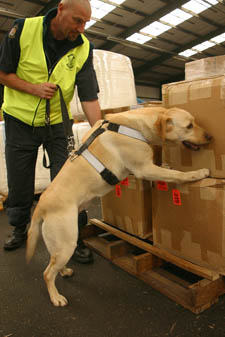NZ Customs upgrades data warehouse

The New Zealand Customs Service has started planning a major upgrade of its internal data warehouse, which has already played a crucial role in helping to identify and apprehend drug traffickers.

(Credit: NZ Customs)
The Customs data warehouse project, named Nexus, has been in place in its present form since 2001, running on a Microsoft SQL Server 2000 back-end with Cognos as its analysis and presentation layer.
With 1,300 staff, the New Zealand Customs Service is responsible for processing 9 million passengers each year.
The warehouse incorporated data from a variety of systems, including passenger movements and goods import information, and presented it in a series of standardised reports, explained chief customs officer John Priest during a presentation at the Cognos World user forum on the Gold Coast this week.
The current data warehouse was 800GB in size and growing at around 20GB each month, with 500 staff regularly accessing the system.
The ability to quickly group information ranging from the volume of incoming planes to the travel habits of individuals had proved invaluable, Priest said: "We've given our analysts the ability to make better decisions."
One recently developed warrant report allows Customs officers to quickly generate the necessary paperwork to apply to courts for a search or seizure warrant.
Reports drawn from Nexus had proved particularly useful in countering the growing trade in methamphetamines, Priest said, helping to identify possible drug mules and associates.
Upgrade plans
Customs upgraded from Cognos 7.1 to 8.2 in 2007,
but was already planning to update the system to the 8.4 release
this year, Priest said.
Further changes in the near future would include examining whether an extranet-style environment could be developed to allow other trusted government agencies to access relevant data.
Monthly reports were regularly distributed via email and fax, but this was a relatively inefficient process. "Data mining is something the business wants to look at," Priest said.
Customs also wants to introduce Cognos' Go! Office software, which provides access to reports using standard desktop tools such as Microsoft Office or mobile devices such as the BlackBerry, and enhance charting functions to make use of GPS data on vessel movements which is already in the warehouse.
Nexus was a good demonstration of how data warehousing could be useful even outside the traditional confines of fiscal planning and prediction, Priest said. "Warehouses aren't always finance-based or planning based."
Angus Kidman travelled to Queensland as a guest of Cognos.